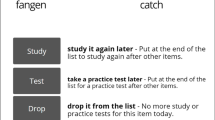Abstract
The effects of choice and no choice of preferred and non preferred instructional activities on the academic behavior of 3 students with disabilities were investigated. Participant preferences for spelling tasks were assessed and an ABCDEF design was used to examine choice and preference within 6 experimental conditions: a) choice of preferred tasks, b) choice of non preferred tasks, c) no choice of preferred tasks, d) no choice of non preferred tasks, e) no choice of preferred tasks (yoked-control), and f) no choice of non preferred tasks (yoked-control). Results indicate that all 3 participants had higher levels of task engagement when working with preferred tasks, regardless of a choice or no choice format. The findings from this investigation contribute to the growing body of research that focuses on developing interventions that are responsive to individual student preferences.
Similar content being viewed by others
REFERENCES
Bambara, L. M., Ager, C., & Koger, F. (1994). The effects of choice and task preference on the work performance of adults with severe disabilities. Journal of Applied Behavior Analysis, 27, 555–556.
Bannerman, D. J., Sheldon, J. B., Sherman, J. A., & Harchik, A. E. (1990). Balancing the right to habilitation with the right to personal liberties: The rights of people with developmental disabilities to eat too many doughnuts and take a nap. Journal of Applied Behavior Analysis, 23, 79–89.
Cole, C. L., Davenport, T. A., Bambara, L. M., & Ager, C. L. (1997). Effects of choice and task preference on the work performance of students with behavior problems. Behavioral Disorders, 22(2), 65–74.
Cooper, L. J., Wacker, D. P., Thursby, D., Palgmann, L. A., Harding, J., Millard, T., & Derby, M. Analysis of the effects of task preferences, task demands, and adult attention on child behavior in outpatient and classroom settings. Journal of Applied Behavior Analysis, 25, 823–840.
Dunlap, G., dePerczel, M., Clarke, S., Wilson, D., Wright, S., White, R., & Gomez, A. (1994). Choice making to promote adaptive behavior for students with emotional and behavioral challenges. Journal of Applied Behavior Analysis, 27, 505–518.
Dunlap, G., & Kern, L. (1993). Assessment and intervention for children within the instructional curriculum. In J. Reichle & D. P. Wacker (Eds.), Communicative alternatives to challenging behavior: Integrating functional assessment and intervention strategies (pp. 177–203). Baltimore, MD: Paul H. Brookes.
Dunlap, G., Kern-Dunlap, L., Clarke, S., & Robbins, F. R. (1991). Functional assessment, curricular revision, and severe behavior problems. Journal of Applied Behavior Analysis, 24, 387–397.
Dunlap, G., Kern, L., dePerczel, M., Clarke, S., Wilson, D., Childs, K. E., White, R., & Falk, G. D. (1993). Functional analysis of classroom responding for students with emotional and behavioral disorders. Behavioral Disorders, 18, 275–291.
Dyer, K. (1987). The competition of autistic stereotypy behavior with usual and specially assessed reinforcers. Research in Developmental Disabilities, 8, 607–626.
Dyer, K., Dunlap, B., & Winterling, V. (1990). Effects of choice making on the serious problem behaviors of students with severe handicaps. Journal of Applied Behavior Analysis, 23, 515–524.
Foster-Johnson, L., Ferro, J., & Dunlap, G. (1994). Preferred curricular activities and reduced problem behaviors in students with intellectual disabilities. Journal of Applied Behavior Analysis, 27, 493–504.
Green, C. W., Reid, D. H., White, L. K., Halford, R. C., Brittain, D. P., & Gardner, S. M. (1988). Identifying reinforcers for persons with profound handicaps: Staff opinion versus systematic assessment of preferences. Journal of Applied Behavior Analysis, 21, 31–43.
Guess, D., Bendon, H. S., & Siegel-Causey, E. (1985). Concepts and issues related to choice-making and autonomy among persons with severe disabilities. Journal of the Association for Persons with Severe Handicaps, 10, 79–86.
Kern, L., Childs, K. E., Dunlap, G., Clarke, S., & Falk, G. D. (1994). Using assessment-based curricular intervention to improve the classroom behavior of a student with emotional and behavioral challenges. Journal of Applied Behavior Analysis, 27, 7–19.
Koegel, R. L., Dyer, K., & Bell, L. K. (1987). The influence of child-preferred activities on autistic children's social behavior. Journal of Applied Behavior Analysis, 20, 243–252.
Meyer, L., & Evans, I. M. (1989). Nonaversive interventions for behavior problems: A manual for home and community. Baltimore, MD: Paul H. Brookes.
Mithaug, D. E., & Mar, D. K. (1980). The relation between choosing and working prevocational tasks in two severely retarded young adults. Journal of Applied Behavior Analysis, 13, 177–182.
Parsons, M. B., & Reid, D. H. (1990). Assessing food preferences among persons with profound mental retardation: Providing opportunities to make choices. Journal of Applied Behavior Analysis, 23, 183–195.
Parsons, M. B., Reid, D. H., Reynolds, J., & Bumgarner, M. (1990). Effects of chosen versus assigned jobs on the work performance of persons with severe handicaps. Journal of Applied Behavior Analysis, 23, 253–258.
Shevin, M., & Klein, N. K. (1984). The importance of choice-making for students with severe disabilities. Journal of the Association for Persons with Severe Handicaps, 9, 159–166.
Author information
Authors and Affiliations
Corresponding author
Rights and permissions
About this article
Cite this article
Killu, K., Clare, C.M. & Im, A. Choice vs. Preference: The Effects of Choice and No Choice of Preferred and Non Preferred Spelling Tasks on the Academic Behavior of Students with Disabilities. Journal of Behavioral Education 9, 239–253 (1999). https://doi.org/10.1023/A:1022143716509
Issue Date:
DOI: https://doi.org/10.1023/A:1022143716509




